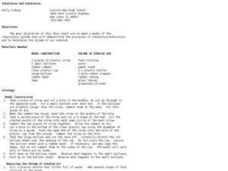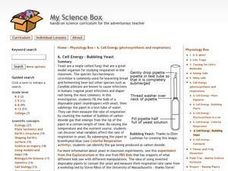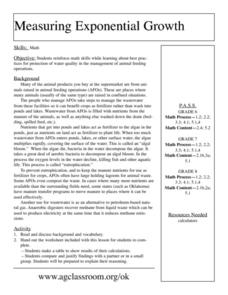Nemours KidsHealth
Asthma: Grades K-2
Students explore asthma. In this respiratory system and asthma lesson, students identify the body parts related to the respiratory system and explain each part's function. Students construct a 3-D replica of the respiratory system using...
Curated OER
Discovering the Breakdown
Fifth graders investigate diseases of the respiratory system. In this respiratory system lesson, 5th graders research, using a variety of sources, the common diseases this system. They determine the causes of a breakdown in the system...
Texas Instruments
Can You Breathe Like a Pinniped?
Young learners compare the breathing patterns of different animals in this pinniped lesson. They examine the breathing pattern of California sea lions and northern elephant seals. Pupils collect, compare and analyze data concerning...
Curated OER
Carbon Cycle Game
In this carbon cycle lesson, middle schoolers review the carbon cycle and visit stations in the room where they experience every phase in the carbon cycle. Students journal about their journey through the cycle and brainstorm ways humans...
Curated OER
Respiratory System
Students examine the human respiratory system through an interactive online activity. In this respiratory system lesson, learners label the various parts of the respiratory system by clicking and dragging the names to the appropriate...
Curated OER
Photosynthesis, Respiration, and the ATP-ADP Cycle
Students explore the processes of photosynthesis and respiration. In this photosynthesis and respiration lesson plan, students learn about the role of the chloroplasts in photosynthesis and about the role of mitochondria in respiration...
Curated OER
Inhalation and Exhalation
Students investigate inhalation and exhalation of the respiratory system. They construct a model of the respiratory system using balloons, straws, cups, and rubber bands. Then, they observe inhalation and exhalation and measure the...
Curated OER
Hibernation and Torpor
In this hibernation activity, students read about the differences between hibernation and torpor. Then students determine how long it takes for an animal to warm up or cool down its body. Students complete 4 short answer questions.
Curated OER
Energy in a Cell
In this cell energy learning exercise, learners are given clues about the light capturing process in plants and the energy producing reactions in animals to complete a crossword puzzle.
Curated OER
Body System Challenge
In this body systems worksheet, students are given terms related to the eleven body systems hidden in a word search. They find the terms and write them on the lines under the proper body system.
Curated OER
Human Body Basics
In this human body worksheet, learners are given clues to find hidden words in boxes. Topics include the human body systems, the components of living things and the building blocks of life.
Curated OER
Label the Respiratory System
In this labeling the respiratory system worksheet, learners observe an illustration of the respiratory system and label the heart, ribs, trachea, bronchioles, diaphragm, lung, and bronchus. Students write seven names.
Curated OER
The Human Body
In this human body worksheet, 6th graders respond to 13 different questions related to parts of the human body. First, they determine how many times the heart beats a minute and the 2 types of blood vessels. Then, students describe the...
Curated OER
Respiration
In this science worksheet, students answer 14 questions about respiration. For example, "Cellular Respiration starts off with..."
Curated OER
Cell Energy - Bubbling Yeast
Students identify that yeast are a single celled fungi that are a great model organism for studying respiration in the classroom. They also fill the bulb of a disposable pipet (eyedropper) with yeast, then submerge the pipet in a test...
Curated OER
How Can We Make a Model of Lungs?
Fifth graders examine the function of the lungs and create a model of the lungs. Using a plastic cup, drinking straw, plastic bag, small balloon, and a rubber band, they follow step-by-step directions to construct simulated lungs. ...
Curated OER
Measuring Exponential Growth
Students reinforce math skills while learning about best practices
for protection of water quality in the management of animal feeding
operations. They make a table to show results of their calculations and compare and justify findings...
Curated OER
An Environmental Puzzle: The Carbon Cycle
Students are introducced to how respiration and photosysnthesis cycle carbon through ecosystems. They read background information that describes the role of the Sun as Earth's ultimate energy source and explains how the energy...
Curated OER
Straw Breathing Exercise
High schoolers fill out an anonymous questionaire to explore whether they might have asthma. They then set up a spreadsheet to enter the data, decide on a definition of asthma, and figure out the prevalence of asthma. Pupils simulate...
Curated OER
Circulatory and Respiratory Systems
Eighth graders are able to write a paragraph describing each system based on the information retrieved in class. They trace a route from Holly Springs, MS to Greenwood using the maps that they were given. Students discuss the role of...
Curated OER
Take Deep Breath
Fifth graders become familiar with how the diaphragm expands to draw air into our lungs and contracts to exhale carbon dioxide. They also label the major parts of the respiratory system through the use of interactive Internet research...
Curated OER
Not Just A Bag of Air
Fifth graders label the parts of the respiratory system. They distinguish among the functions of its major organs. They construct a model of the respiratory system. They watch an animated video and utilize the Internet for research of...
Curated OER
Coal Derivatives
Students use this hands-on activity to demonstrate the production of coke, one of the most widely used raw materials derived from coal. They are also stimulated to do research into the differences in coal types and coal products.
Curated OER
Detectives
Students research the respiratory system and the diseases that affect it.
They construct a model of a pair of working lungs and develop an experiment that will decrease lung inflation.in addition, they create a portfolio of their findings.

























